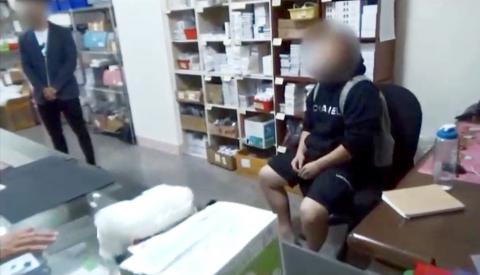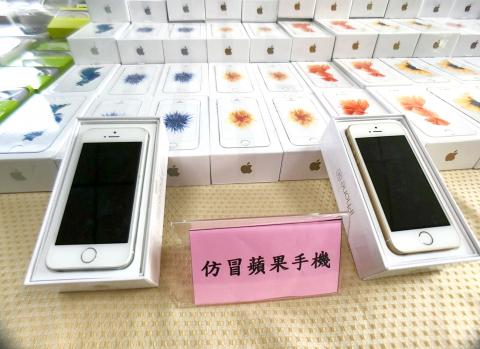Taoyuan police this week raided several locations and busted an illegal business operated by Chinese selling bogus Apple Inc iPhones.
“We busted a criminal operation that involved groups in Taiwan and China working together. They sold pirated versions of iPhones and iPhone parts,” said Lin Chih-ming (林志明), captain of the Second Police Special Corps of National Police Agency.
Police found “ more than 3,000 fake handsets and related products with an estimated value of about NT$10 million [US$324,929],” Lin said.

Photo copied by Hsu Kuo-chen, Taipei Times
Police have arrested a Chinese man surnamed Li (李), 22, and several other Chinese, along with three Taiwanese women suspected of working with the group, Lin added.
Investigators suspect that the group’s operations were based in China’s Hubei Province, as the Chinese suspects are all from Hubei, police said.
During questioning they said that they had entered Taiwan under the pretense of undergoing cosmetic surgery, which grants them a 15-day stay, police said.

Photo: Hsu Kuo-chen, Taipei Times
“We believe that this is a seasoned criminal operation, with the group’s ringleaders in Hubei, running the fake iPhone business in Taiwan. The Chinese suspects applied for visas in successive groups on the pretext of undergoing cosmetic surgery, and were replaced with another group after 15 days, when their visas ran out,” Lin said.
Police confiscated 135 iPhones and 44 Samsung handsets at a shop run by the group, along with smartphone components, which Lin said were all found to be counterfeit products made in China.
Meanwhile, police officers raiding a warehouse found a total of 3,847 assorted items, including iPhone and Samsung handsets, power adapters, earphones and other accessories, which were all found to be pirated products, Lin said.
The Chinese suspects also ran online ads to sell the fake devices and parts on auction platforms popular among Taiwanese, police said.
A accounting ledger seized by police showed that the group has made an average of about NT$2 million per month since May last year.
The group advertised the fake handsets as second-hand smartphones in good condition, demonstration kits or devices left over from special promotions, and priced them at about 10 percent off the market price, or a discount of about NT$2,000 to NT$5,000 per handset, Lin said.
Police said they have questioned all the suspects, adding that the three Taiwanese said they were hired to sell the devices and denied knowledge of the products’ origins.
The investigation is ongoing, police added.
Prosecutors said that they intend to charge the ring members with contravening the Trademark Act (商標法).

‘FORM OF PROTEST’: The German Institute Taipei said it was ‘shocked’ to see Nazi symbolism used in connection with political aims as it condemned the incident Sung Chien-liang (宋建樑), who led efforts to recall Democratic Progressive Party (DPP) Legislator Lee Kun-cheng (李坤城), was released on bail of NT$80,000 yesterday amid an outcry over a Nazi armband he wore to questioning the night before. Sung arrived at the New Taipei City District Prosecutors’ Office for questioning in a recall petition forgery case on Tuesday night wearing a red armband bearing a swastika, carrying a copy of Adolf Hitler’s Mein Kampf and giving a Nazi salute. Sung left the building at 1:15am without the armband and apparently covering the book with a coat. This is a serious international scandal and Chinese

PERSONAL DATA: The implicated KMT members allegedly compiled their petitions by copying names from party lists without the consent of the people concerned Judicial authorities searched six locations yesterday and questioned six people, including one elderly Chinese Nationalist Party (KMT) member and five KMT Youth League associates, about alleged signature forgery and fraud relating to their recall efforts against two Democratic Progressive Party (DPP) legislators. After launching a probe into alleged signature forgery and related fraud in the KMT’s recall effort, prosecutors received a number of complaints, including about one petition that had 1,748 signatures of voters whose family members said they had already passed away, and also voters who said they did not approve the use of their name, Taipei Deputy Chief Prosecutor

UNDER ATTACK: Raymond Greene said there were 412 billion malicious threats in the Asia-Pacific region in the first half of 2023, with 55 percent targeting Taiwan Taiwan not only faces military intimidation from China, but is also on the front line of global cybersecurity threats, and it is taking action to counter those attacks, President William Lai (賴清德) said yesterday. Speaking at the opening of this year’s Cybersec Expo in Taipei, the president assured foreign diplomats and exhibitors that Taiwan remained committed to strengthening its defense against cyberattacks and enhancing the resilience of its digital infrastructure. Lai referenced a report from the National Security Bureau (NSB) indicating that the Government Service Network faced an average of 2.4 million intrusion attempts daily last year, more than double the figure

COUNTERINTELLIGENCE TRAINING: The ministry said 87.5 percent of the apprehended Chinese agents were reported by service members they tried to lure into becoming spies Taiwanese organized crime, illegal money lenders, temples and civic groups are complicit in Beijing’s infiltration of the armed forces, the Ministry of National Defense (MND) said in a report yesterday. Retired service members who had been turned to Beijing’s cause mainly relied on those channels to infiltrate the Taiwanese military, according to the report to be submitted to lawmakers ahead of tomorrow’s hearing on Chinese espionage in the military. Chinese intelligence typically used blackmail, Internet-based communications, bribery or debts to loan sharks to leverage active service personnel to do its bidding, it said. China’s main goals are to collect intelligence, and develop a